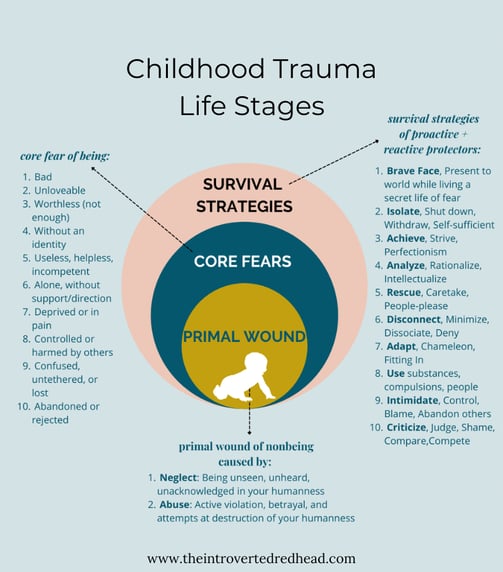Healing and Growth: A Journey Beyond Childhood Trauma
By embracing your past and focusing on your strengths, you can become the best version of yourself despite the struggles you've faced.
8/31/20243 min read


Recovering from childhood trauma is a profound journey that involves embracing self-love and personal growth. The healing process typically begins with awareness and acknowledgment of past experiences, which is crucial for understanding their impact on your current life.
Untreated childhood trauma can have profound and lasting effects on mental health, influencing individuals throughout their lives. Key long-term impacts include:
Mental Health Disorders
Individuals who experienced childhood trauma are at a significantly higher risk of developing mental health issues such as depression, anxiety, and post-traumatic stress disorder (PTSD). Research indicates that those with adverse childhood experiences (ACEs) can be up to three times more likely to face mental health challenges in adulthood.
Emotional and Behavioral Issues
Long-term effects often manifest as emotional dysregulation, low self-esteem, and difficulties in forming trusting relationships. Survivors may experience anger, aggression, and changes in appetite, along with increased anxiety and fearfulness.
Biological Changes
Childhood trauma can disrupt normal brain development and stress response systems, leading to chronic health issues. This dysregulation can result in heightened stress responses, making individuals more susceptible to various physical health conditions, including heart disease and diabetes.
Coping and Resilience
While the effects can be severe, many individuals show resilience and can lead fulfilling lives with appropriate support and therapeutic interventions. Access to trauma-informed care can significantly mitigate these long-term impacts.Understanding these effects is crucial for developing effective treatment strategies and fostering supportive environments for those affected by childhood trauma.
Common Misconceptions About Healing from Childhood Trauma
Trauma is short-term: Many believe that trauma effects fade over time, but the reality is that trauma can have lifelong effects, often requiring ongoing support and treatment.
Only extreme experiences are traumatic: Trauma is subjective; events like divorce or emotional abuse can be just as impactful as physical harm. It’s essential to recognize that all experiences are valid.
Healing means forgetting: Some think recovery involves erasing memories of trauma. Instead, healing is about learning to manage and integrate these experiences into your life.
People who experience trauma will always develop PTSD: Not everyone who experiences trauma will suffer from PTSD. Some may experience post-traumatic growth, finding strength and purpose from their experiences.
You will suffer from trauma for the rest of your life: While trauma can leave lasting effects, many individuals can and do lead fulfilling lives after trauma with the right support and therapies.
Effective Coping Strategies
Therapy: Engaging in therapy, such as Cognitive Behavioral Therapy (CBT) or Eye Movement Desensitization and Reprocessing (EMDR), can help process trauma and develop coping mechanisms.
Mindfulness and Meditation: Practicing mindfulness can enhance emotional regulation and help you stay grounded in the present moment, reducing anxiety and intrusive thoughts.
Journaling: Writing about your experiences can provide an outlet for emotions and help clarify thoughts, making it easier to process feelings.
Building a Support Network: Surrounding yourself with understanding friends and family can provide emotional support and validation, which are crucial for healing.
Self-Compassion: Treat yourself with kindness and understanding. Acknowledge your struggles without judgment and allow yourself to feel your emotions fully.
In Conclusion
As we've explored, the path to healing from childhood trauma is both challenging and deeply transformative. While the long-term effects of untreated trauma can be significant, impacting mental health, emotional well-being, and even physical health, it's crucial to remember that healing is always possible.
By dispelling common misconceptions about trauma recovery and embracing effective coping strategies, survivors can embark on a journey of self-discovery and growth. Whether through therapy, mindfulness practices, or building supportive relationships, each step towards healing is a triumph.Remember, your past experiences do not define your future. With self-compassion, patience, and the right support, you can not only recover from childhood trauma but also flourish, becoming the best version of yourself. Your resilience is a testament to your strength, and your journey of healing can inspire others on their own paths.
As you continue on this journey, be kind to yourself. Celebrate your progress, no matter how small it may seem. You are not alone in this process, and there is hope and beauty in the growth that comes from overcoming adversity. Your story of healing and transformation has the power to light the way for others, creating a ripple effect of positivity and resilience in the world.
With love and understanding,
The Introverted Redhead




